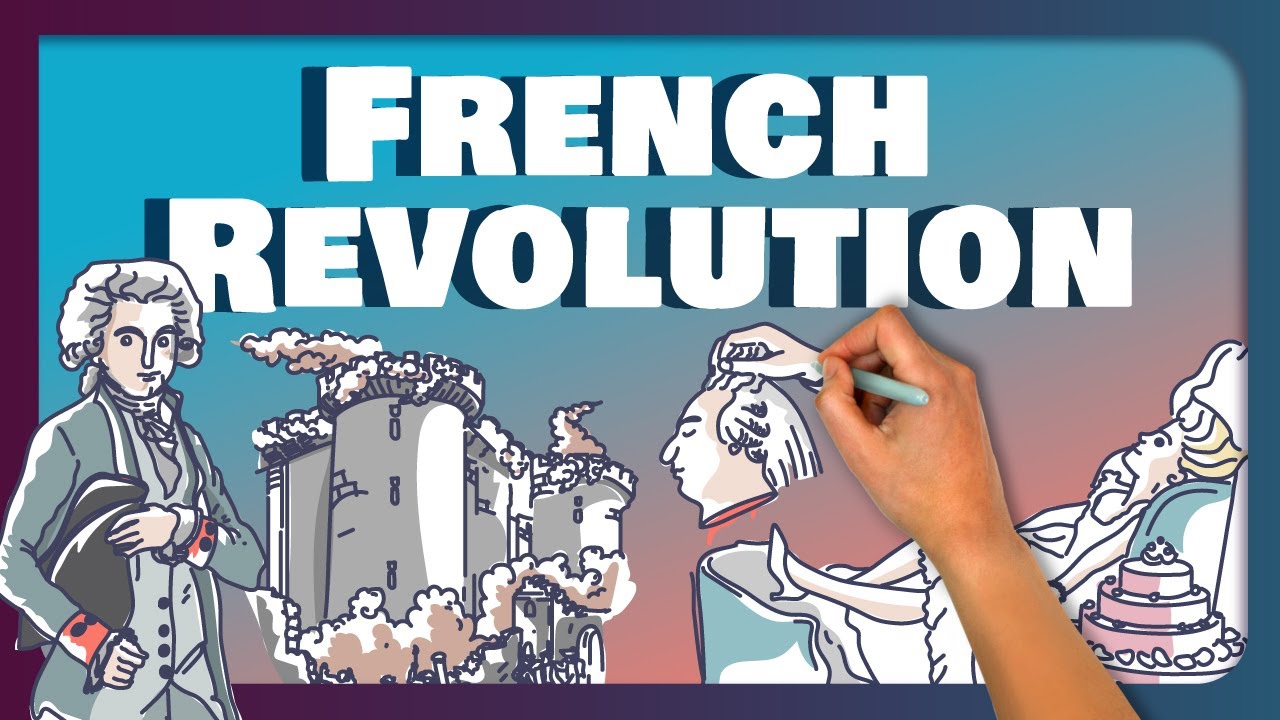Causes of the French Revolution - Video Infographic
Summary
TLDRThe French Revolution, spanning 1789 to 1799, was a pivotal upheaval where the populace overthrew King Louis XVI's absolute monarchy, ushering in a republic founded on liberty, equality, and fraternity. Key catalysts included Enlightenment ideals, the rigid estate system with discontent among the Third Estate, Louis XVI's ineffective rule, adverse weather leading to famine, and economic turmoil from costly wars and royal extravagance, all converging to spark a questioning of monarchical authority.
Takeaways
- 📜 The French Revolution (1789-1799) was a major historical event that overthrew the monarchy of King Louis XVI and led to a republic based on liberty, equality, and fraternity.
- 💡 The Age of Enlightenment was a key cause, with thinkers like Rousseau, Locke, Voltaire, and Montesquieu influencing ideas of liberty and equality.
- 🏛️ French society was divided into three estates: the clergy, the nobility, and the Third Estate, which made up 98% of the population but had little power.
- 😠 The Third Estate was resentful of the privileges of the first two estates and bore the brunt of taxes, leading to growing dissatisfaction.
- 👑 King Louis XVI ruled as an absolute monarch, holding complete control over politics, economics, and authority, which fueled anger among peasants.
- 🌾 Harsh weather conditions, including severe winters and droughts, led to poor harvests, famine, and increased suffering for French peasants, exacerbating unrest.
- 🍞 Bread shortages were particularly devastating for peasants, as it was their main source of food, fueling their frustration.
- 💸 France’s economic crisis was worsened by participation in expensive wars, including the American War of Independence, and the extravagant lifestyle of King Louis XVI and Queen Marie Antoinette.
- 🏚️ The near-bankruptcy of the French Treasury due to excessive spending and wars pushed the country to the brink of revolution.
- ⚖️ Enlightenment ideals and widespread economic hardship caused the French people to question the leadership of King Louis XVI, contributing to the outbreak of the revolution.
Q & A
What was the French Revolution and when did it take place?
-The French Revolution was a major historical event where the French people overthrew the absolute monarchy of King Louis XVI and established a republic based on the principles of equality, liberty, and fraternity. It took place from 1789 to 1799 CE.
What were the main principles on which the French Republic was founded?
-The French Republic was founded on the principles of equality, liberty, and fraternity.
What were the major causes of the French Revolution?
-Several major causes of the French Revolution include the Age of Enlightenment, the estate system in France, the absolute monarchy of Louis XVI, weather conditions before 1789, and the economic crisis.
How did the Age of Enlightenment contribute to the French Revolution?
-The Age of Enlightenment introduced new ideas about society and authority. The ideals of liberty and equality, which played a crucial role in overthrowing King Louis XVI, were inspired by the writings of Enlightenment thinkers like Jean-Jacques Rousseau, John Locke, Voltaire, and Montesquieu.
What was the estate system in France and how did it affect society?
-The estate system in France divided society into three classes: the First Estate (Roman Catholic clergy), the Second Estate (nobility), and the Third Estate (everyone else, about 98% of the population). The Third Estate paid most of the taxes but had the least power, which led to resentment and contributed to the Revolution.
Why were members of the Third Estate unhappy with their social status?
-The Third Estate was unhappy because they had to bear most of the tax burden but had the least political power, while the First and Second Estates enjoyed privileges and wealth.
What role did King Louis XVI play in the French Revolution?
-King Louis XVI was an absolute monarch with complete control over politics, economics, and authority in France. His weak leadership and the influence of Enlightenment ideas caused many French people to question his authority, which contributed to the Revolution.
How did weather conditions before 1789 contribute to the Revolution?
-France experienced harsh weather conditions, including severe winters and extreme summers, leading to poor harvests and famine. Many peasants relied on bread as their main food source, and these conditions exacerbated their suffering and discontent.
How did economic crisis contribute to the French Revolution?
-France faced an economic crisis due to its participation in expensive wars, like the American War of Independence, and the extravagant lifestyle of King Louis XVI and Queen Marie Antoinette. This drained the French Treasury and brought the country close to bankruptcy, prompting people to question the leadership.
What were the consequences of the economic mismanagement under King Louis XVI?
-Economic mismanagement under King Louis XVI, including heavy spending on wars and lavish royal expenses, led to financial instability, making it one of the key factors that ignited the French Revolution.
Outlines

هذا القسم متوفر فقط للمشتركين. يرجى الترقية للوصول إلى هذه الميزة.
قم بالترقية الآنMindmap

هذا القسم متوفر فقط للمشتركين. يرجى الترقية للوصول إلى هذه الميزة.
قم بالترقية الآنKeywords

هذا القسم متوفر فقط للمشتركين. يرجى الترقية للوصول إلى هذه الميزة.
قم بالترقية الآنHighlights

هذا القسم متوفر فقط للمشتركين. يرجى الترقية للوصول إلى هذه الميزة.
قم بالترقية الآنTranscripts

هذا القسم متوفر فقط للمشتركين. يرجى الترقية للوصول إلى هذه الميزة.
قم بالترقية الآنتصفح المزيد من مقاطع الفيديو ذات الصلة
5.0 / 5 (0 votes)






